|
|
|
Sort Order |
|
|
|
Items / Page
|
|
|
|
|
|
|
| Srl | Item |
| 1 |
ID:
101283
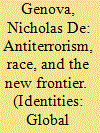

|
|
|
|
|
| Publication |
2010.
|
| Summary/Abstract |
Following Barack Obama's election as United States president, the illusion that the worst excesses of the Bush administration are now simply finished must be tempered by a sober assessment of the deeply consequential institutionalization of antiterrorism as the intransigent idiom of a new species of security state formation. Obama's assumption of responsibility for the conduct of the so-called War on Terror has committed him to the dominant ethos of antiterrorism and a multifaceted program of securitization, "domestically" and internationally. Furthermore, the task of reinvigorating United States nationalism by exalting American exceptionalism is one that deeply conjoins Obama with his predecessor. This is, perhaps, nowhere so evident as in Obama's dissimulations of the racial singularity and salience of his accession to the presidency. Indeed, he compulsively deracialized his election in favor of an American exceptionalist gesture of patriotic postracialism. This essay interrogates the relation between this "postracial" Americanism and a distinctly imperial multiculturalism. Through this "postracial" and assimilationist vision of empire, and by means of the crucial (racially ambiguous) figure of the Muslim, the United States has fashioned itself as the decisive police power of an incipient Global Security State, charged with putting in order the wild new frontiers of an unruly planet.
|
|
|
|
|
|
|
|
|
|
|
|
|
|
|
|
| 2 |
ID:
101285
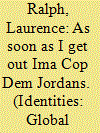

|
|
|
|
|
| Publication |
2010.
|
| Summary/Abstract |
Sudhir Venkatesh and Steven Levitt's influential 2000 article transformed the way social scientists study gangs by showing the context in which Chicago gang members built an organization modeled on a corporation. But if this research helped to demonstrate that the underground economy is a logical response to the inner city's isolation from the rest of the country, it also makes it difficult to see that the very same factors that have led to urban decay and "social isolation" (i.e., escalating unemployment, the loss of manufacturing jobs, and the emergence of gangs to fill bureaucratic voids) serve to connect gangs to wider social worlds. This study expands upon recent gang research by detailing the improvisational economic and social practices, as well as the intricate narratives, and the social practices that allow Chicago gangs and their members to access a variety of people, institutions, and resources, while marking the diverse modes of historical consciousness that gang affiliates develop. A gang that I will here be calling the "Divine Aces" forms a powerful case in point
|
|
|
|
|
|
|
|
|
|
|
|
|
|
|
|
| 3 |
ID:
101286
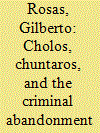

|
|
|
|
|
| Publication |
2010.
|
| Summary/Abstract |
By advancing what I am calling the new frontier of the United States and Mexico as central in the formation of subjectivities, this article foregrounds two contemporary figures: 'cholos' and the 'chuacutentaros.' The former is how a particular group of youths, who called themselves Barrio Libre or the Free 'Hood, self-identified and the term is often common shorthand for 'gang' in much of the Americas. The term speaks to the premiere figure of an anxiety about unchecked, undocumented, and criminalized racial and cultural flows in the Americas. The cholos of Barrio Libre preyed on 'chuacutentaros,' the provincial 'hick' of an increasingly urbanizing, migrating Mexico. 'Chuacutentaros' has also become a term for the alien bodies that pass through daily projects of state sovereignty at the margins of two states, specifically United States and Mexican intensifying militarized policings and their dramatic abandonments. In this article, I situate these practices within the history of largely unacknowledged racisms in Mexico, tied to projects of mestizaje.
|
|
|
|
|
|
|
|
|
|
|
|
|
|
|
|
| 4 |
ID:
101284
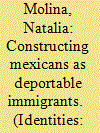

|
|
|
|
|
| Publication |
2010.
|
| Summary/Abstract |
This article draws on archival records of events in California's Imperial Valley in 1940 that resulted in the arrests and deportation of a group of Mexican workers, some of whom were known union activists. The workers had entered the country lawfully and had lived in the United States for years. These immigrants were nevertheless vulnerable because they were receiving treatment for a communicable disease. This, according to immigration officials, rendered them "likely to become a public charge" (LPC), a deportable offense. Officially designating Mexicans as LPCs discredited them at the same time that it circumvented any discussion of possible violation of labor rights or civil rights, both key aspects of government-sponsored reform efforts underway at the time. Constructions of subjects as illegal, diseased, and threats to the nation-state came together in such a way that provided a surefire formula for marking Mexicans as deportable.
|
|
|
|
|
|
|
|
|
|
|
|
|
|
|
|
| 5 |
ID:
101282
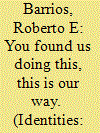

|
|
|
|
|
| Publication |
2010.
|
| Summary/Abstract |
This article analyzes the changing ways law enforcement agencies, city government officials, and gentrifying resident constituencies have attempted to criminalize and surveil disposition-forming rituals and daily social practices of African American working class New Orleanians before and after Hurricane Katrina. The rituals and practices discussed include pedestrian parades known as Second Lines and Super Sunday. The article demonstrates that the criminalization and surveillance of these practices must be understood in light of the role played by socially structured space in the production of racialized class differences among New Orleanians. In the post-Katrina context, the city's mandatory evacuation enabled gentrifying resident constituencies and expert urban planners to imagine the city's reconstruction as something to be achieved through the creation of architectonic relationships conducive to cycles of capital investment. These visions of urban recovery have ignored the importance residents of affected neighborhoods place on the reinstatement of the city's pre-Katrina population, which is responsible for the production of Second Lines and Super Sunday. This article explores how the policing, surveillance, and criminalization of Second Lines and Super Sunday have historically operated as mechanisms for upholding hegemonic orders, and the intimate connections between planning, race, and gentrification in the US.
|
|
|
|
|
|
|
|
|
|
|
|
|
|
|
|
|
|
|
|
|